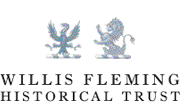|
“The grandfather [Dr Thomas Willis] is the key to Browne Willis's interest in genealogy and, leading therefrom, to his passion for antiquity ...”
J G Jenkins (1897-1972)
The Project is presently cataloguing Willis's collected printed books and manuscripts, and his own letters and papers, building on preliminary work undertaken over the past four years. Much of the original material from the Library is now 'lost', perhaps destroyed, and its existence can only be deduced and described from records. Willis's biographer J G Jenkins admitted in The Dragon of Whaddon (1953) that he had not exhausted even the available manuscript sources.
- Collected printed books: The details of many ex libris volumes have already been complied in the database, the earliest being The Golden Legende (Caxton, 1483). Books were often heavily annotated by Willis, and some rebound with his notes. The database will include details of any known annotations by Willis, and details of previous owners, &c.
“The History and Antiquities of the Cathedral Church of Salisbury and the Abbey Church of Bath, by Dr. Richard Rawlinson, plates, 8vo. LARGE PAPER, fine presentation copy from the Author to Browne Willis, the celebrated antiquary, who has enriched it with numerous most valuable additions and corrections which ought to be preserved in the archives of the kingdom for future historians, 3l. 3s. 1719"
- Collected historical manuscripts: Some 30 formerly in the possession of Willis have been identified, including cartularies, MS bibles, and papers of other antiquaries.
- Papers of Dr Thomas Willis: The only manuscript of Thomas Willis (1621-1675) known to survive in the present is a single clinical casebook. But Browne Willis held a collection of his grandfather's papers, including notebooks, autopsy reports, and volumes of letters received from 'eminent men' (the doctor's friends and collaborators included Christopher Wren, Robert Boyle, and William Petty).
- Correspondence of Browne Willis: Willis was a prolific writer of letters, and many survive in public collections. The Project has identified 120 correspondents for whom letters to/from Willis survive, or are transcribed, or published. These include antiquaries such as Thomas Hearn, Thomas Baker, John Hutchins, and Francis Peck. The Project has identified more than 500 letters written by Willis, held by 16 repositories in the United Kingdom and the USA. Details of all these letters will be added to the database, their contents summarised, and transcripts of selected letters made.
“It is impossible to go far in the learned correspondence of his century without becoming aware of the great voice gusty in the wings.”
Helen Waddell (1889-1965)
- Papers written by, or commissioned by, Browne Willis. Willis amassed a large collection of research material for his studies. These include handwritten transcripts of other printed works made by Willis, his amanuensis, and even his own children. A full description of the papers of Browne Willis will be made, building on existing catalogues, such as the Bodleian Summary Catalogue.
- Browne Willis's personal family papers (his "family pictures"), such as his 'Green Book', 'Alphabet of Arms', and 'Collections of Fleming'.
- Numismata Willisiana: Willis's collection of English coins and tokens, "at that Time looked upon as the most complete Collection in England, and which he had been upwards of Forty Years in collecting".
- The "rubbish and sweepings" of Willis's Library at the time of his death.
The provenance and present location of all items will be recorded, where known. The correspondence will be cross-referenced with the printed books and manuscripts (many correspondents are authors of works in the Library, and Willis's letters often discuss books he has purchased, been given, or presented).
|

